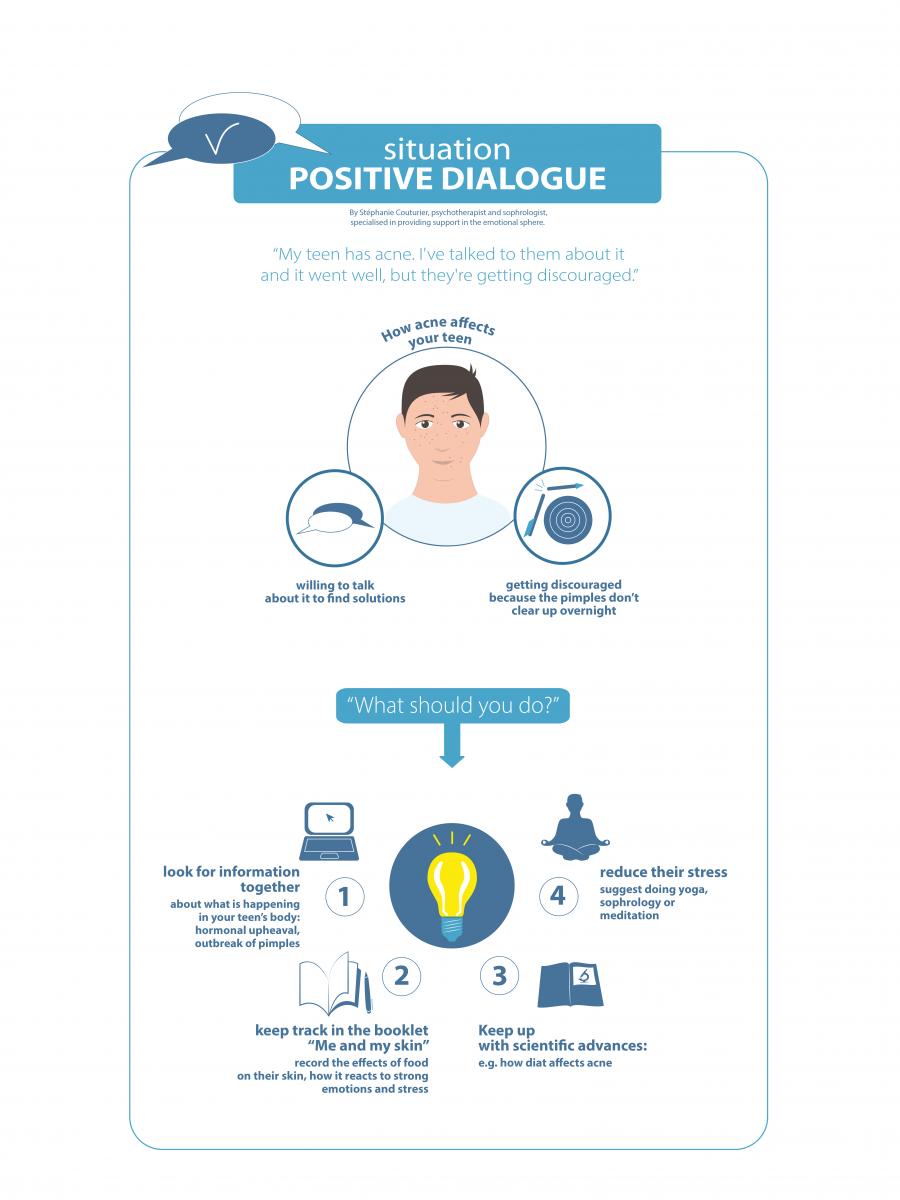My teen's got acne : Positive dialogue
My teen has acne. I've talked to them about it and it went well.
How can I keep their motivation up, even if the treatments don't start to work immediately?
If the communication channels are open and your teen listens to you, it shows that they trust you and your help will be very valuable.
If so, it can be hard to stay motivated and continue to believe in treatments that are not always miraculous.
Build up your teen's motivation again and try to understand together why the acne is persistent.
Treating acne is like running a marathon. It's vitally important to keep up your efforts and be conscientious about following the course of treatment. Stay on track and believe in yourself. Never give up. The more your teen stays confident and motivated, the better the end results! You can be sure that, one day, the pimples will become less frequent and eventually disappear altogether. The aim is to curb and control the period of acne outbreaks and speed up their complete disappearance.
Suggest that your teen tracks progress in their acne treatment
Filling in a few columns every night, like keeping a diary, will help your teen understand their skin's reactions.
They might discover that strong emotions or stress have an effect on their skin. Or that too much fatty food, sugar, coffee or other foods bring out more pimples. Or, on the contrary, that a certain way of eating or a certain activity seem to have a beneficial effect.
Even if there are certain similarities, each person reacts differently to different solutions: what is good for one person's skin will not always work well for someone else. So there's nothing better than trying to understand what works for them personally so that they can tweak their routine and see how it works. Seeing how their skin improves, week by week, can be very motivating. And as they write about themselves, teens create their own personal space where they can express themselves freely. This boosts their well-being and is great for their motivation and self-confidence!
Together look up the latest scientific advances.
We are lucky enough to live in the digital age, when information around the world is readily accessible and available for consultation from the comfort of your own home. The latest scientific data blames acne outbreaks on dairy products and sugary foods. Talk to your teen about whether they might be eating too much of these foods.
Take the opportunity to get them talking and thinking about their diet in general (the teen years are not always synonymous with healthy eating!). Help your child set certain limits and certain objectives (no more than one fast food meal per week, cut down on sodas, etc.): even if there is no guarantee that it will improve your teen's skin, healthy eating will definitely help them feel better both physically and mentally!
Also do research together on current recommendations regarding cosmetics, for example. Help your child understand the major role played by bacterial balance on the skin, and make the right choice of dermo-cosmetic creams to help clear up pimples without irritating their skin. Help them understand why they should be careful and protect themselves from the sun.
In short, help them take care of themself by grasping the importance of the little, everyday things they do.
Help your teen reduce their stress
Stress has a significant effect on acne, so shouldn't be overlooked in this long-term effort. Why not share yoga, sophrology or mindfulness meditation with your child to help them connect to the soothing resources within?
Not only will it help them channel their enthusiasm and maintain their self-esteem, it will give them inner resources for facing the ups and downs of life. It will also be a wonderful opportunity to share good times and nurture a close, comforting bond of trust, which is so important during this period of upheavals. Alongside your unwavering presence and support, patience and perseverance will be the greatest allies for maintaining your teen's self-confidence and self-esteem.
To conclude, it is not easy to talk about this subject because it concerns your teen's privacy and feelings at an age when they are breaking away from their parents and becoming their own person. However it is also a good way to reassure them that you are there to help them, to consolidate a bond of trust and to open up a new area of communication.
Your teen will come to realise that patience and a positive self-image will be the optimal solution for coping with this transition to the adult world.
To cope with the trials of everyday life, your teen still needs you. That's why DUCRAY is by your side. Visit ducray.com for expert advice and a range of dermatologist-approved and recommended skincare products.



